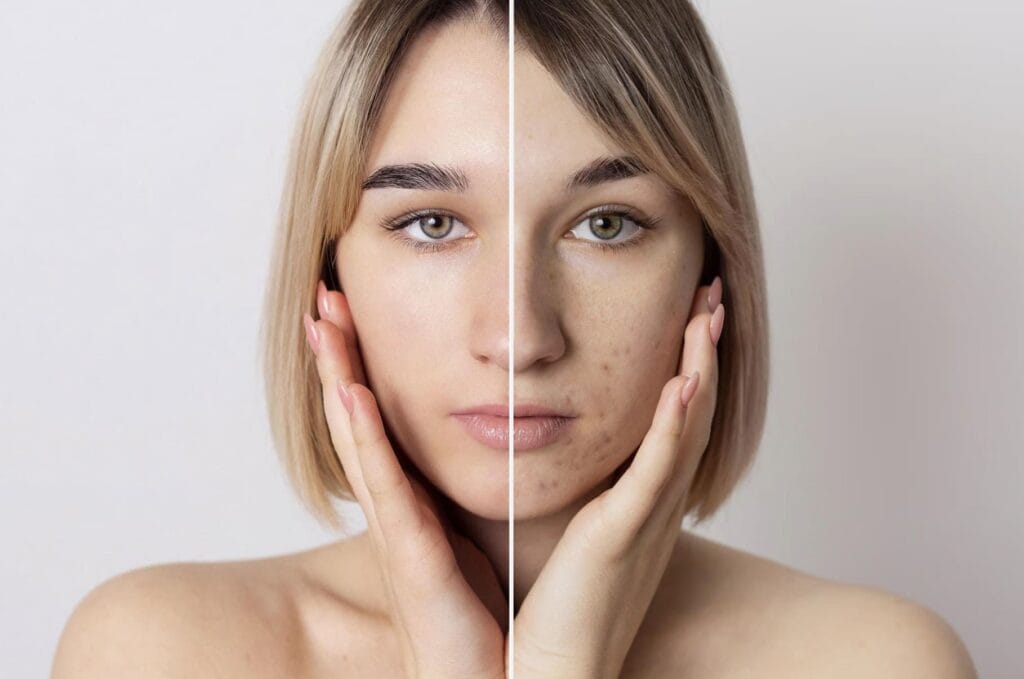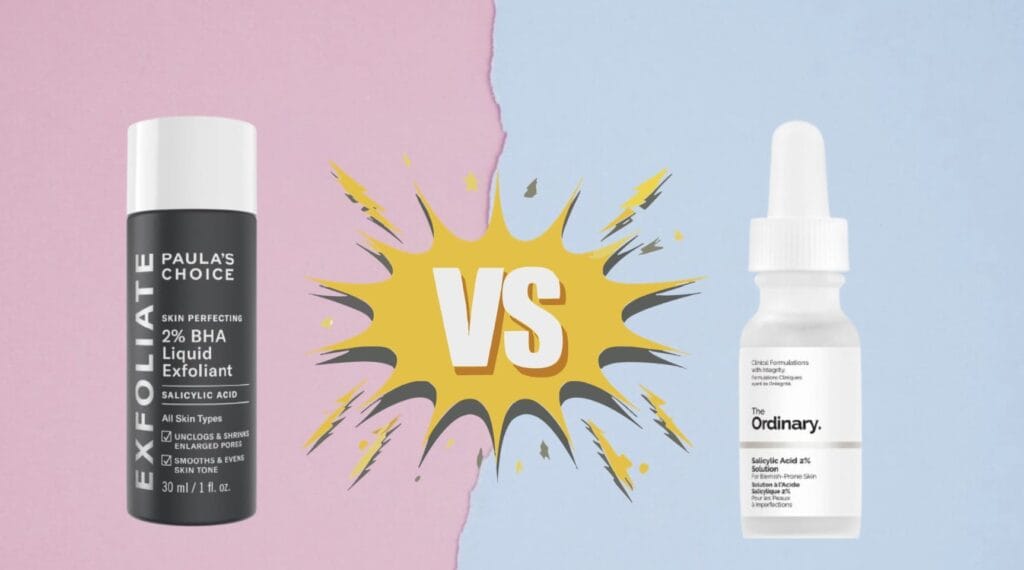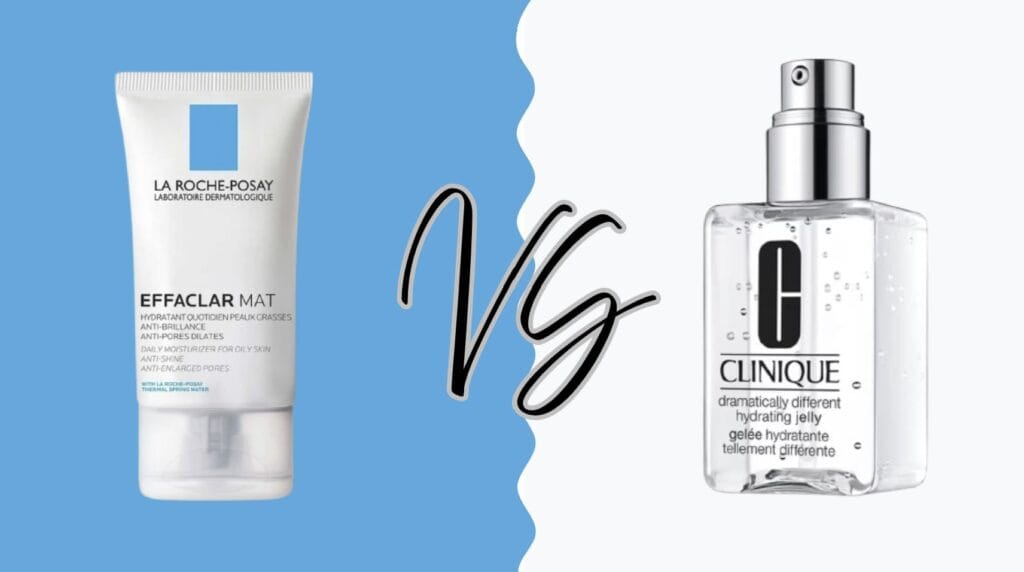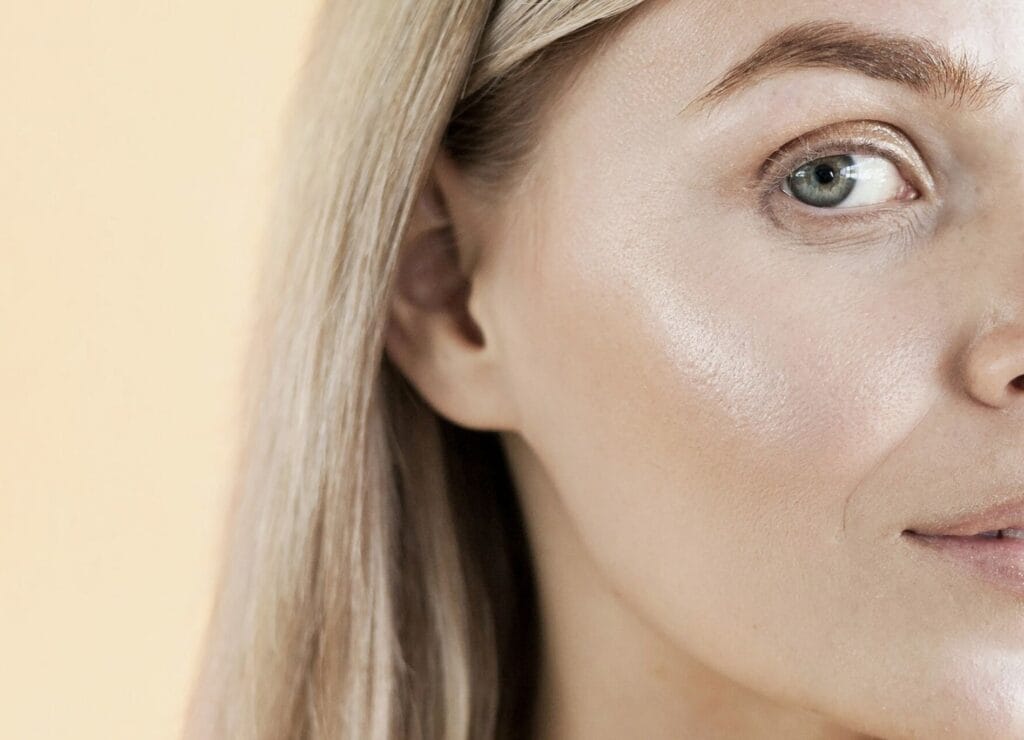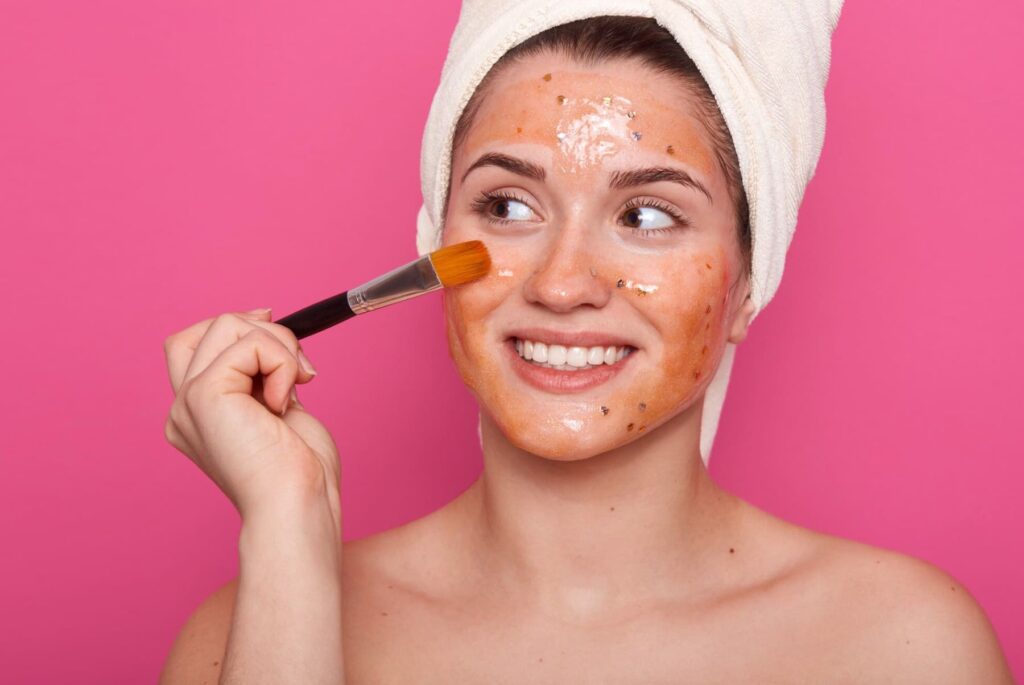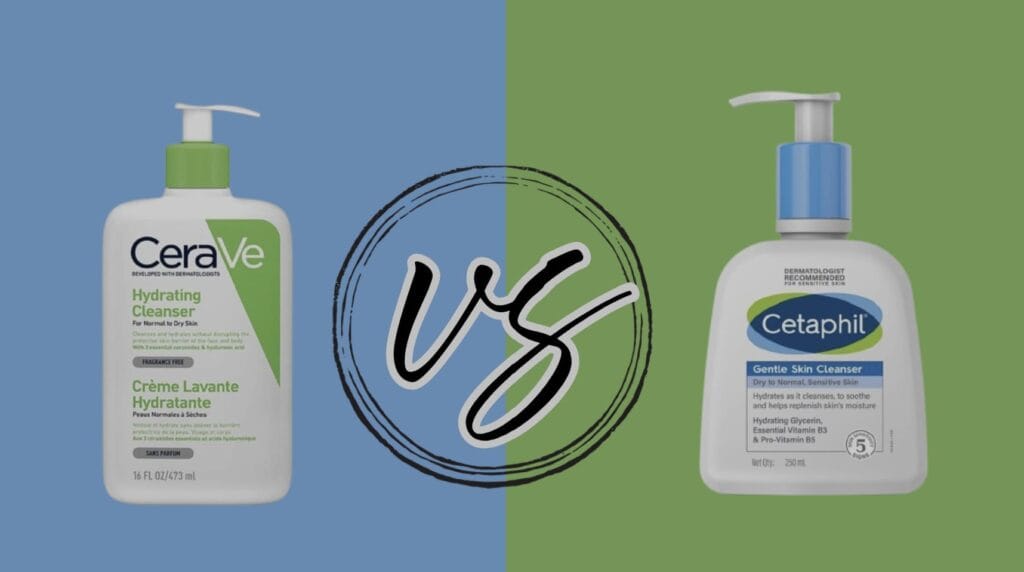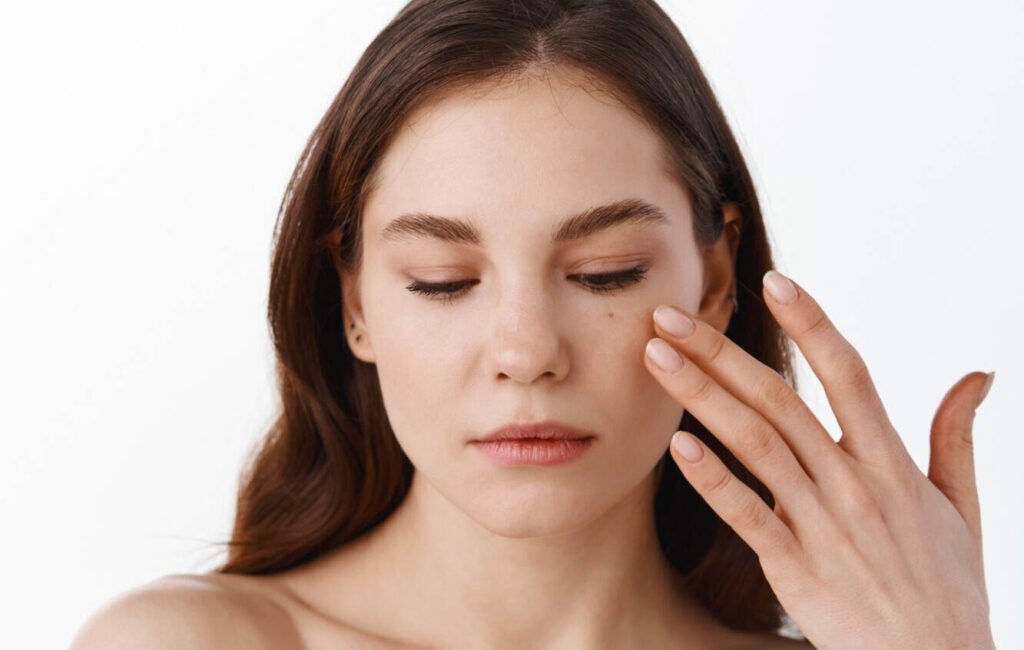If you’ve found traditional SPF products to be too greasy and irritating for your skin, you’re about to find a new BFF in this CeraVe option, which is both gentle and effective.
Sun protection should be a lifestyle, and not just for beach days! If so, you’ve likely used one too many b c y products in your search for something that won’t cause breakouts, leave a white cast or make you feel like your face is an oil spill. Enter the CeraVe Hydrating Mineral Sunscreen SPF 50.
Created by dermatologists, this is far more than mere SPF sun protection; it’s skincare from the sun. You may also want to check out my CeraVe Hydrating Mineral Sunscreen SPF 50 Review where I’ll share my experience with the sunscreen, go over the ingredients and why it has been or should be your choice of SPF 50 for daily wear.
So if you’re looking for a CeraVe sunscreen for your sensitive skin that ticks all the right boxes — hydrating, mineral-based, and dermatologist-approved, of course — keep reading.
Also Read: CeraVe Foaming Facial Cleanser Review: Best Daily Cleanser for Oily and Combination Skin
Did You Know?
Research reveals that as much as 90% of visible aging — wrinkles, dark spots, leathery skin and more — is caused by the sun. Which is why adding a dermatologist-recommended sunscreen to your routine, such as CeraVe Hydrating Mineral Sunscreen SPF 50, is one of the best things you can do for your skin’s long-term health.
At a Glance: What You Need to Know
| Feature | Details |
|---|---|
| Product Name | CeraVe Hydrating Mineral Sunscreen SPF 50 |
| SPF Rating | 50 |
| Formulation | Mineral (Zinc Oxide and Titanium Dioxide) |
| Skin Type | Suitable for sensitive skin |
| Key Ingredients | Niacinamide, Ceramides, Hyaluronic Acid |
| Texture | Lightweight, non-greasy |
| Water Resistance | 40 minutes |
| Price Range | Affordable |
A Closer Look: CeraVe Hydrating Mineral Sunscreen SPF 50
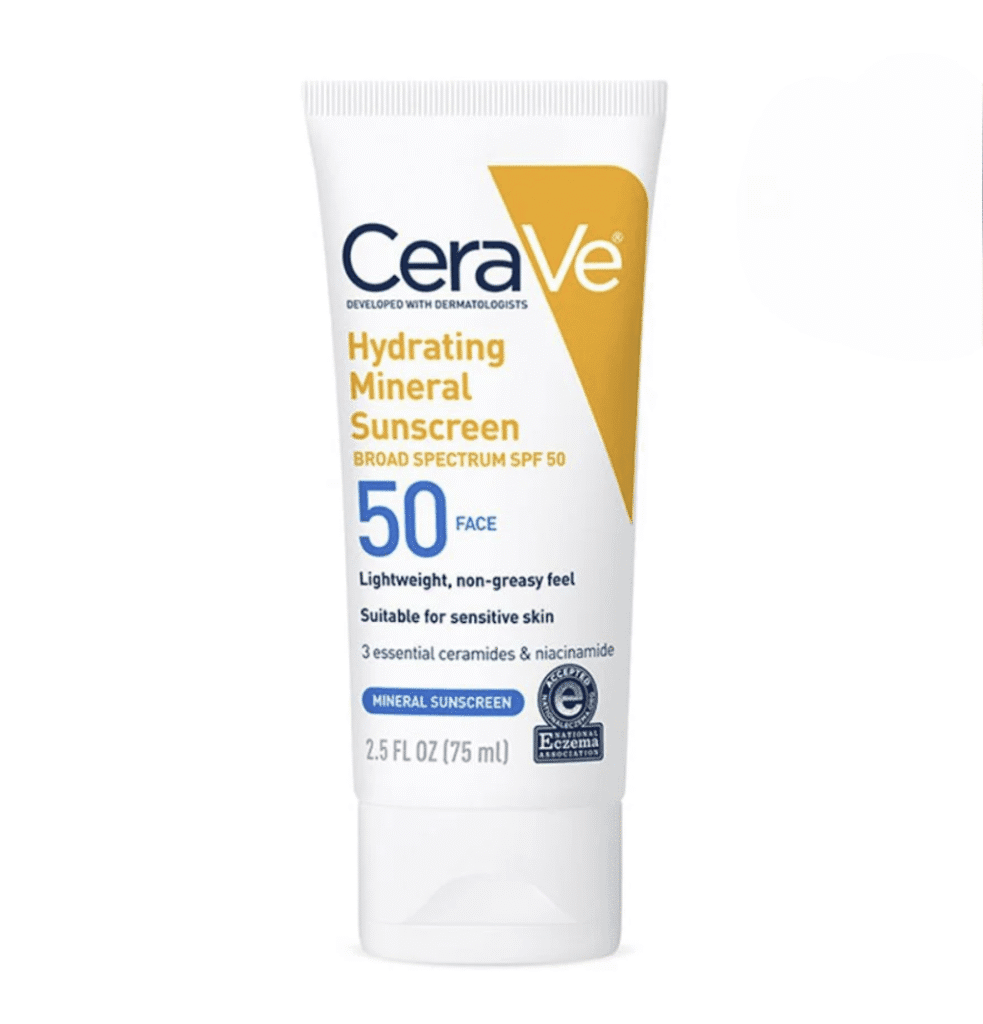
The CeraVe Hydrating Mineral Sunscreen SPF 50 is a well-loved sunscreen for sensitive skin. Here are some of its key features:
- Its active ingredients are titanium dioxide (9%) and zinc oxide (7%). They form a barrier right at the surface of the skin to deflect away UVA and UVB rays, making it an ideal option for those who have sensitivities to chemical sunscreens.
- Delivers superior protection against UVA (aging) and UVB (burning) rays.
- Ceramides (1, 3, 6-II) to provide 24-hour hydration & help restore the protective skin barrier.
- Hyaluronic acid draws and binds moisture to the skin.
- Niacinamide (Vitamin B3) soothes the skin and helps to prevent moisture loss.
- It’s oil-free, fragrance-free, paraben-free, allergy-tested and non-comedogenic, so it’s sensitive-skin friendly and even safe for people with eczema.
- The mineral filters (titanium dioxide and zinc oxide) are official Hawaii compliant too, so you will not find any oxybenzone and avobenzone in here.
- It’s been awarded the Skin Cancer Foundation Daily Use Seal of Approval.
Key Ingredients and Their Functions
Getting to know the ingredients in your sunscreen is particularly important if you have sensitive skin. Let’s take a closer look at the CeraVe Hydrating Mineral Sunscreen SPF 50:
- Zinc Oxide (10%): Mineral-based sunscreen agent with strong UV absorption properties.
- Titanium Dioxide (4%): Another mineral that blocks UV rays.
- Niacinamide: Renowned for being anti-inflammatory, it soothes and aids the skin in barrier function.
- Ceramides: These lipids are key to supporting the skin’s natural barrier and maintaining moisture levels while guarding against environmental stressors.
- Hyaluronic Acid: A potent humectant that attracts water to the skin promoting all-day hydration.
First Look: My Thoughts on the Packaging
The CeraVe Hydrating Mineral Sunscreen SPF 50 is slim and applicator-friendly for an effortless application. The packaging is travel-friendly and you can carry it with you. With its flip-top cap, you can easily control the amount of product you use. The packaging is in line with CeraVe’s no-frills, user-friendly approach.
Who Should Try this Sunscreen?
This sunscreen is ideal for:
- People with sensitive skin.
- If you’re in the market for a CeraVe sensitive skin sunscreen.
- If you’re after an everyday SPF 50.
- Dermatologist-approved sunscreen fans.
- Skincare minimalists in search of protection + hydration in one.
How I Use It for Best Results
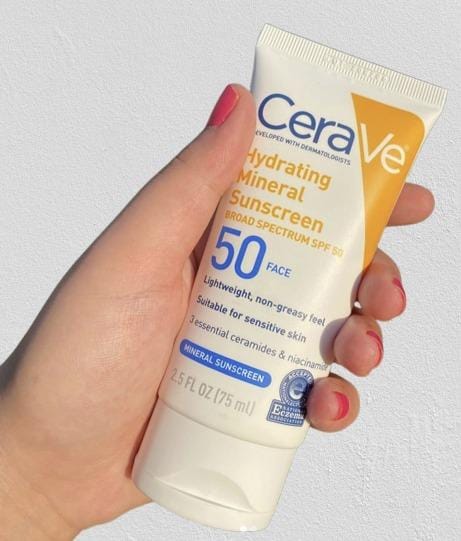
To maximise the benefits of CeraVe Hydrating Mineral Sunscreen SPF 50, follow these simple application tips:
- Apply Generously: A nickel-sized amount is a good amount for your face, more for your body.
- Reapply: Reapply at least every 2 hours or after swimming or sweating.
- Layer: For optimal results, you should use after your moisturizer and before your make-up.
Pair It With
To enhance your skincare routine, consider pairing the CeraVe Hydrating Mineral Sunscreen SPF 50 with CeraVe Hydrating Cleanser and CeraVe Moisturizing Cream for added hydration before applying sunscreen
User Reviews: What People Are Saying
The CeraVe Hydrating Mineral Sunscreen SPF 50 is widely raved about for its light weight feel and high sun protection. Here’s a few common thoughts from actual users:
- Not Greasy: Very Non-Greasy Users like that it doesn’t leave a greasy feel, so you’re able to wear it everyday.
- Hydration: Hyaluronic acid and ceramides mean skin stays hydrated throughout the day, several testers have reported.
- Sensitive Skin Approved: For sensitive skin users, there have been no redness or irritation, which is a huge plus.
Editor’s Note: My Skin Type & Experience
I have combination skin that’s also touch sensitive so was excited to test CeraVe Hydrating Mineral Sunscreen SPF 50. After a few weeks of using it, I found it to be incredibly gentle and moisturizing. It didn’t break me out or cause irritation, which is always a concern with sunscreens. Its lightweight formulation made it easy to wear under makeup, and I appreciated that it offered such high SPF protection.
How It Stacks Up Against Other Sunscreen
| Feature | CeraVe Hydrating Mineral SPF 50 | Neutrogena Ultra Sheer SPF 50+ | La Roche-Posay Anthelios SPF 50 | EltaMD UV Clear SPF 46 |
|---|---|---|---|---|
| Type | Mineral | Chemical | Mineral/Chemical | Mineral/Chemical |
| Key Benefit | Hydrating and barrier support | Lightweight, matte | Antioxidants and fluid texture | Acne-prone, calming |
| White Cast | Mild | Minimal | Low | Minimal |
| Skin Suitability | Best for sensitive skin | All skin types | Sensitive to combo skin | All skin types |
Mini Sunscreen Face-Off
Yet even among all this stiff competition, the CeraVe Hydrating Mineral Sunscreen SPF 50 stands out for its barrier-friendly contents and high SPF protection.
Want deeper insights? You can read my full reviews of EltaMD UV Clear SPF 46 and Neutrogena Ultra Sheer Dry-Touch SPF 50+ for a more detailed comparison to CeraVe Hydrating Mineral in actual use.
Pros and Cons
Pros
- Perfect for daily use with SPF 50.
- Ceramides and hyaluronic acid to add moisture.
- Lightweight texture, absorbs quickly.
- It’s Recommended by Dermatologists.
- Great for Sensitive Skin, Gentle formula decreases irritation.
Cons
- Some people experiencing a mild white cast, because of its mineral formula.
- Slightly expensive.
Final Thoughts: Is It Worth Adding to Your Routine?
Overall, if you need sunscreen for everyday use that combines UV protection and moisture, you can’t go wrong with the CeraVe Hydrating Mineral Sunscreen SPF 50. Its Dermatologist recommended formulation and soft and smooth texture can be used every day, even in sensitive skin.
So there you go, the CeraVe Hydrating Mineral Sunscreen SPF 50 is definitely worth the try for sun protection and skin health realness! From its hydrating power to its dermatologist-approved formula, you’ve got a natural product you can depend on to take care of both your skin and your health.
FAQs
Does it cause any white casting on the skin?
Some people do notice a light white cast from the mineral-based actives, but it typically disappears in minutes.
Can I wear makeup on top of this sunscreen?
Absolutely! The lightweight texture also allows makeup to layer on top.
Is this sunscreen waterproof?
Yes, it is water-resistant for up to 40 minutes.

